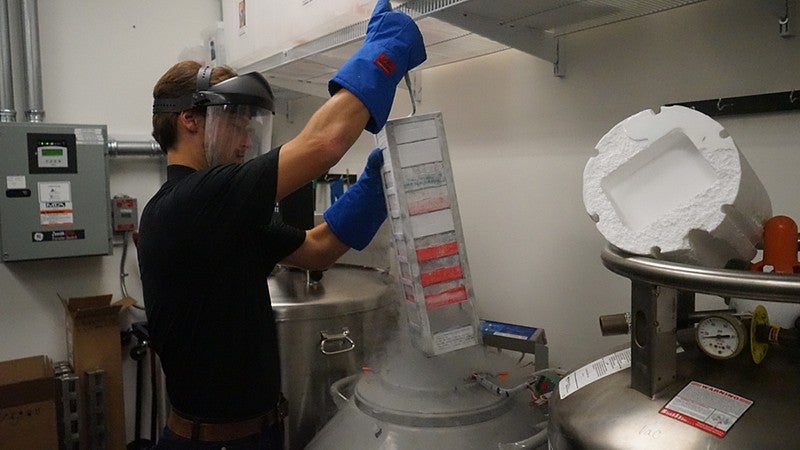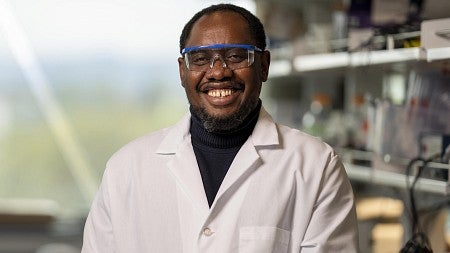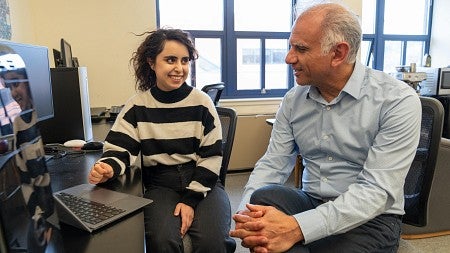
Biochemistry Graduate Shines at Advanced BioCatalytics
A command of the scientific method serves cancer therapies, stem-cell treatments, and agriculture
By Matt Cooper • Ocrober 2, 2019
3 min read
It was 2015 and Eric Nummedal was ready to celebrate the fruit of his yearlong experiment on neurons and vision. The junior and his lab mates had reviewed every step, double-checked every calculation, eliminated every assumption. All that remained were the results—numbers sure to confirm the team’s theories.
But the numbers didn’t say what Nummedal expected them to say about receptive fields in the brain. In fact, the numbers didn’t make much sense.
Was there gnashing of teeth? Issuing of expletives? Launching of lab equipment?
Not Nummedal. He simply chuckled, shrugged his shoulders, and began developing a new line of inquiry based on what the team had just learned.
“What we were hoping would be the final piece of a puzzle was ultimately the first piece of a new puzzle,” says Nummedal, BS ’16 (biochemistry, biology). “That’s extremely satisfying—when things don’t make sense and it makes questions, you’re pushing the boundaries of knowledge, and that’s what science is all about.”
It takes a special kind of scientist to draw inspiration from failure. Nummedal is that scientist.
As an undergraduate, he cut a wide swath of excellence, earning honors and scholarships and winning awards in the hard sciences and business. That track record set Nummedal up for immediate success upon graduation: his first job was research lead for a life sciences company, and he’s moved to new employers twice since to take on ever more responsibility for R & D.
Nummedal has dabbled in business leadership and helped develop cancer immunotherapies and stem-cell treatments to restore vision. His employers have tasked him with exhaustive investigations ranging from data analytics and cellular mechanisms to sensory systems, education outcomes, and business strategy.
Tying them all together, Nummedal says, is the approach ingrained in him as an undergraduate in the lab to get at the truth of something: the scientific method, those unbending rules of hypothesis, experiment, and deduction established centuries ago to investigate phenomena, obtain knowledge, and test theories.
“The scientific method is one of our greatest achievements,” says Nummedal. “You wouldn’t think there would be any relationship between cancer immunotherapies or brain research and what I’m doing now, but it’s all about applying the scientific method and showing whether something is true or not.”
Nummedal has grown photoreceptor cell "precursors" (circular object at upper left) from stem cells, a promising approach for treating age-related blindness
Nummedal recently joined Advanced BioCatalytics, an industrial biotech company in California, where he guides research and development. The company’s trademarked product—based on “protein synergists”—improves the performance of cleaners, industrial and agricultural wetting agents, and wastewater treatment applications, among other uses.
“They are challenging me in ways I haven’t been challenged before,” says Nummedal, who manages the research that guides decision-making about new products to develop. “But to understand a new field, you just tie that into research. There is a specific way that ideas are presented and answers are found, and with the background I have I know how to get them.”
Nummedal has championed the value of scientific inquiry to students in multiple returns to campus. As a graduate of the McNair Scholars Program, a federally funded initiative that supports undergraduate research, he delights in helping young scientists network into promising jobs and urges them to connect with him on LinkedIn.
“The process of research is very intimately connected not only with expanding knowledge but expanding yourself,” Nummedal says. “When you’re struggling with something, when you feel challenged, when you think you’re the stupidest person in the room—that should excite you. You have the opportunity to grow. Taking advantage of that opportunity is up to you.”
Matt Cooper is managing editor of Oregon Quarterly.




